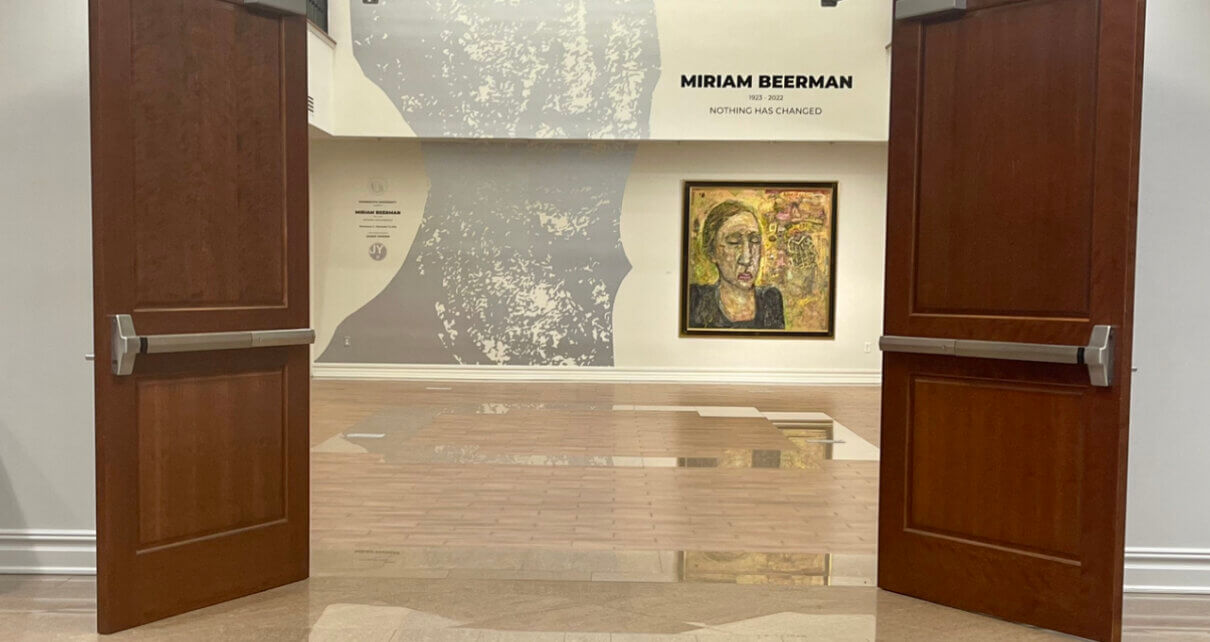If you tend to frequent Rechnitz Hall for classes or extracurriculars, you may have noticed large-scale canvases adorning the walls of the gallery. From Sept. 6 to Dec. 11, Monmouth University will be holding a display of Miriam Beerman’s work in the DiMattio Gallery which is open to the public.
Miriam Beerman, who passed away last February, is a New Jersey artist known best for her painting and printmaking. She is known as a pioneer in the 20th century art world with her work on the walls of over 60 galleries. Especially as a female artist, her work and career are influential to 20th century women artists who were nearly lost to unimportance as a cause of their gender in a male-dominated field.
Beerman was influenced often by social injustice in her world. In her works, she portrays the suffering of man’s inhumanity. Her themes even resonate in today’s world with the injustice faced on a day-to-day basis.
To exhibit Miriam Beerman’s work at Monmouth is influential not only for the art students who pass it daily on their way to class but for all students, faculty, and outsiders who want to experience art and our world from a different perspective.
Corey Dzenko, Ph.D., Associate Professor of Art History, said, “It allows us to consider a range of topics— from ongoing inhumanities to the way Beerman, and many other artists, have historically been written out of history and less recognized in their careers.”
In 1971, Beerman had a solo show at the Brooklyn Museum that paved her way as an artist as it was her first solo exhibition. Despite this, often she was discriminated against as an artist because of her gender.
Dzenko continued, “For Beerman, part of this was because she was a ‘woman artist’ and mother.
Regarding her 1971 solo show at the Brooklyn Museum, the critic David L. Shirey began his critique in the New York Times: “Mrs. Beerman is not an artist.” The show included images of animals, but he said he would not find technique or animals in the exhibition. In his dismissal of her work, he described her as a “housewife and mother as well as a painter,” as if to diminish her role as an artist and her artwork. In another review seven years later, he reversed his criticism, saying that he and others had misunderstood what Beerman was doing.”
Beerman battled with this most of her career and engaged in difficult topics throughout her pieces.
The show is titled “Nothing Has Changed” after her piece by the same name that recognizes the female experience in a different light. Her pieces are monumental in size, thickly painted, and often contain eye-catching figures.
James Yarosh, the curator of the exhibit stated in the catalog, “…One cannot help but be both moved and stirred to be in the presence of the colossal works, heavy with paint, laden with the subject. When you see these humanist expressionist works existing silently, holding the weight of the world, you begin to understand the gallery’s presentation.”
Students alike are also mesmerized by Miriam Beerman’s work and legacy. Jenni Ackerman, a graphic design student, said “I liked hearing about her journey and her life story. Looking at her art, she added animals and distressing images. She said her art doesn’t have a message; instead, it’s how the viewer sees it and that is something that really interested me.”
“Nothing Has Changed,” a collection of 20 large-scale pieces of Miriam Beerman’s work, will be on display in the DiMattio Gallery at Rechnitz Hall from 10 a.m. to 5 p.m. until Dec. 11, 2022. To learn more about the exhibition and Miriam Beerman visit Monmouth University’s Center for the Arts webpage.




